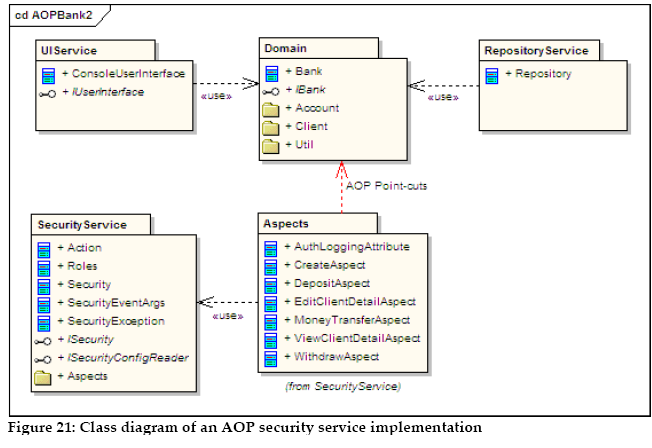如何在特定方面访问当前用户
如果我在这个论文中采用了最后一个场景:

然后我的主要层会是这样的:
- UI服务(MVC应用程序)
- 业务层
- 安全服务(用作MS标识框架的包装类库)
- 使用以前的安全服务授权业务层方法的方面。
public class EditEmployeeData : OnMethodBoundaryAspect
{
public override void OnEntry(MethodExecutionArgs args)
{
Employee emp = (Employee)args.Instance;
((System.Security.Claims.ClaimsIdentity)System.Web.HttpContext.Current.User.Identity).HasClaim("Employee", "EditName");
}
} 我想在运行时设置当前用户。
- 如何访问当前用户,以便在业务层的特定功能上授权他?
- 授权应该更接近UI来禁用/隐藏功能并防止调用不允许的操作方法吗?(在首选的场景中,安全层和UI之间没有任何交互!)
回答 3
Stack Overflow用户
发布于 2018-10-22 04:29:23
更新
请看这个答案关于使用索赔.
在控制器中,您可以获得如下所示的当前用户:
using Microsoft.AspNet.Identity.Owin;
public class MyController : Controller
{
// this code will return 0 if user is not authenticated
protected long GetUserId()
{
// note: I have changed the default UserId type from Guid to long
return User.Identity.GetUserId<long>();
/*
* use this if you are using Guid UserIds (which is the default)
* return User.Identity.GetUserId();
*/
}如果您想知道如何更改UserId__的类型,请参阅UserId。
如果您可以访问HttpContext**,,您可以获得如下用户:**
// note that I have changed UserId from Guid to long
HttpContext.Current.User.Identity.GetUserId<long>()如果您想获得,请使用此 (这里有更多的信息):
// this is how you get user manager from OwinContext
var userManager = System.Web.HttpContext.Current.GetOwinContext().GetUserManager<ApplicationUserManager>();
// Get ApplicationUser from UserManager
ApplicationUser user = UserManager.FindById(User.Identity.GetUserId());如何访问当前用户,以便在业务层的特定功能上授权他?
如果您需要访问服务中的当前用户,您可以通过传递它,也可以通过进行注入。使用inject,您可以将UserId注入到服务中:
kernel.Bind<MyService>().ToConstructor(ctorArg => new MyService(
HttpContext.Current.User.Identity.GetUserId<long>()).InRequestScope(); 这就是MyService类的样子:
public class MyService
{
private readonly long _userId;
public MyService(long userId)
{
// this service always has access to current user (if logged in)
_userId = userId;
}
// more code...我不知道你的授权过程是什么.ASP.NET标识,已经为您实现了授权任务。这是在ApplicationUserManager和ApplicationSignInManager中实现的,后者附带了ASP.NET MVC默认模板。您可以在操作/类上使用[Authorize]属性来防止未经授权的访问:
[Authorize] // <-- restricts all action methods of the class, unless marked [AllowAnonymous]
public class MyController : Controller
{
[HttpPost]
[Authorize] // <-- restricts this particular action method
public ActionResult MyAction(long id)
{
// do some action which requires authorization
}关于DDD层,请看一下这个此链接,它解释了属于每个层的服务。
Stack Overflow用户
发布于 2018-10-19 13:32:41
如何访问当前用户以授权他在业务层中的特定功能?
要访问业务层上的用户信息,可以键入名为ICurrentUser的接口。
namespace AOPSample
{
public interface ICurrentUser
{
User GetCurrentUser();
}
public class User
{
public int Id { get; set; }
public string Username { get; set; }
public string Role { get; set; }
}
}CurrentUser类必须能够从公共位置读取用户的信息。HttpContext可用于此。
让我们为此编写一个助手类。
using System.Web;
namespace AOPSample
{
public class ContextHelper
{
public T Get<T>()
{
T local = default(T);
string key = typeof(T).GUID.ToString();
if (HttpContext.Current.Items.Contains(key))
{
local = (T)HttpContext.Current.Items[key];
}
return local;
}
public T Get<T>(string key)
{
T local = default(T);
if (HttpContext.Current.Items.Contains(key))
{
local = (T)HttpContext.Current.Items[key];
}
return local;
}
public void Set<T>(T value)
{
string str = typeof(T).GUID.ToString();
HttpContext.Current.Items[str] = value;
}
public void Set<T>(T value, string key)
{
HttpContext.Current.Items[key] = value;
}
}
}我们的CurrentUser类将使用助手类返回用户信息。
namespace AOPSample
{
public class CurrentUser : ICurrentUser
{
public User GetCurrentUser()
{
return new ContextHelper().Get<User>();
}
}
}现在,用户信息使用HttpContext类写入ContextHelper类,并为此使用正确的位置拦截器类。
public class EditEmployeeData : OnMethodBoundaryAspect
{
public override void OnEntry(MethodExecutionArgs args)
{
Employee emp = (Employee)args.Instance;
((System.Security.Claims.ClaimsIdentity)System.Web.HttpContext.Current.User.Identity).HasClaim("Employee", "EditName");
new ContextHelper().Set<User>(new User
{
});
}
} 您可以使用ICurrentUser从域层访问用户信息。HttpContext对于每个请求和响应都是唯一的。
是否应该更接近UI来禁用/隐藏功能,并防止调用不允许的操作方法?(在首选的场景中,安全层和UI之间没有任何交互!)
这是你的选择
在我看来,您可以获取用户权限并使用缓存记录它们,并将它们用于客户端操作,但根据服务器端使用的技术,您可以以类似的方式存储每个请求的用户信息。例如,wcf存储OperationContext的正确位置。
Stack Overflow用户
发布于 2018-10-17 17:52:39
如果使用ASP.NET Identity,可以尝试以下方法以获取当前用户:
ApplicationUser user = System.Web.HttpContext.Current.GetOwinContext().GetUserManager<ApplicationUserManager>().FindById(System.Web.HttpContext.Current.User.Identity.GetUserId());
//If you use int instead of string for primary key, use this:
ApplicationUser user = System.Web.HttpContext.Current.GetOwinContext().GetUserManager<ApplicationUserManager>().FindById(Convert.ToInt32(System.Web.HttpContext.Current.User.Identity.GetUserId()));希望这能帮上忙。
https://stackoverflow.com/questions/52803922
复制相似问题

